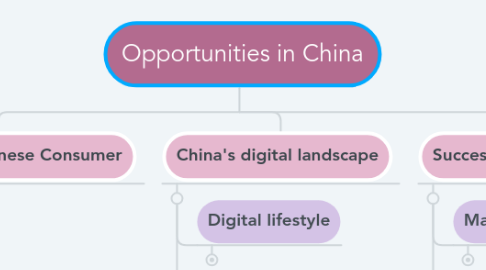
1. The modern Chinese Consumer
1.1. Insights
1.1.1. Burgeois
1.1.1.1. A deep focus on the lifestyle
1.1.2. Well educated
1.1.2.1. Increase in college graduates
1.1.2.1.1. Global view/informed decisions
1.1.3. Connected/isolated
1.1.3.1. Global content users, with a lot of e-friends, but a small close circle
1.2. Needs and desires
1.2.1. Authenticity
1.2.1.1. Connection & localization
1.2.2. Respect for culture
1.2.2.1. Burberry failure, Mcdonald's success
1.2.3. Offline experiences
1.2.3.1. Buying: more than just consumption, is socializing
2. China's digital landscape
2.1. Digital lifestyle
2.1.1. Mobile Payments, App Based Transport, Ecosystem of convenience, "New Retail" as a mix between offline and online
2.2. Many alternatives
2.2.1. For every global well-known digital solutions there are at least 4 alternatives in China.
3. Successful marketing
3.1. Marketing Channels
3.1.1. Weibo
3.1.1.1. Broadcast platform that can redirect to e-shops
3.1.2. WeChat
3.1.2.1. Social, content and commerce ecosystem
3.1.3. Red
3.1.3.1. Women UGC community that can redirect to e-shops
3.1.4. TikTok
3.1.4.1. Short-video UGC community that can redirect to e-shops
3.2. Relevant, Smart, Chinese Marketing
3.2.1. Nicknames
3.2.1.1. A nickname will be given to any brand in China, it can be an advantage
3.2.2. The power of males for beauty
3.2.2.1. Young and delicate males for promoting female skincare
3.2.3. The power of KOLs
3.2.4. Content generation & WeChat
3.2.5. Super Social consumers
3.2.6. Offline to online
3.2.6.1. Hermés campaign
3.2.6.1.1. Cultural localization, Marni Miao alliance

